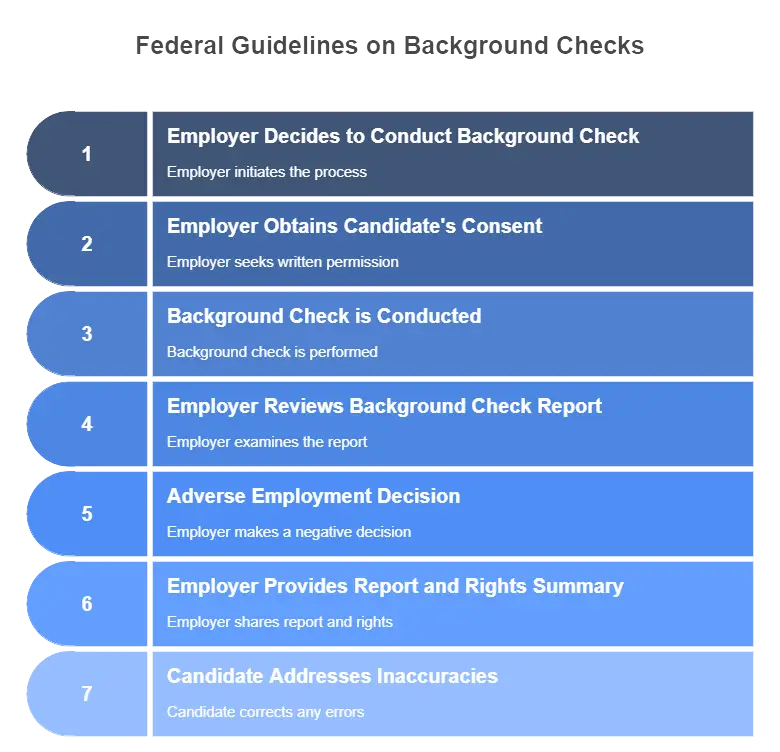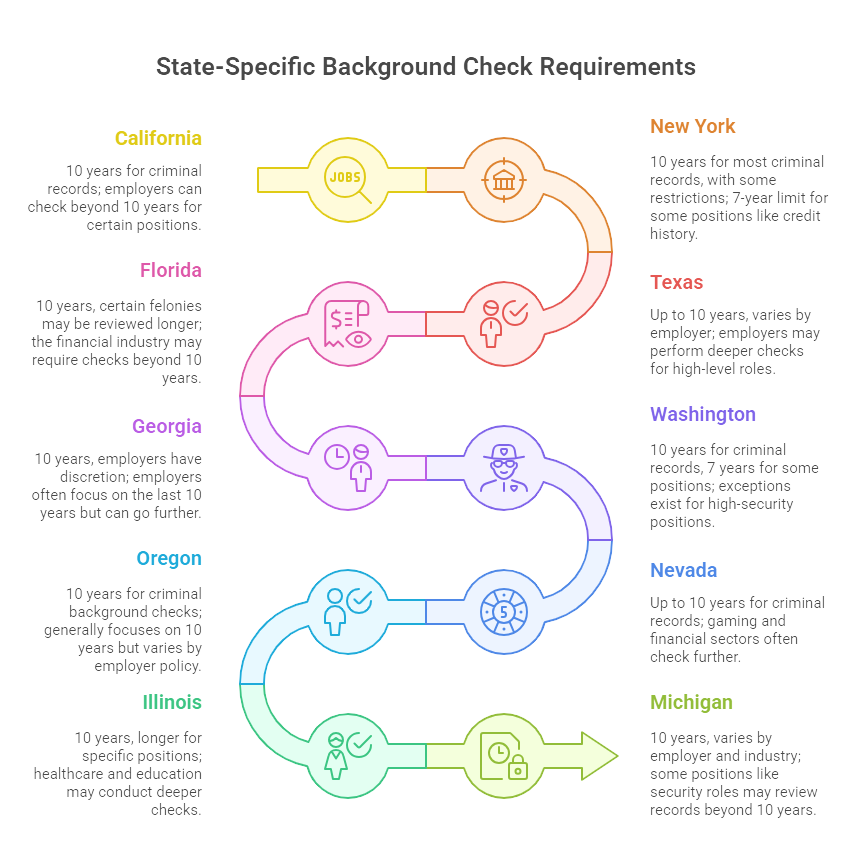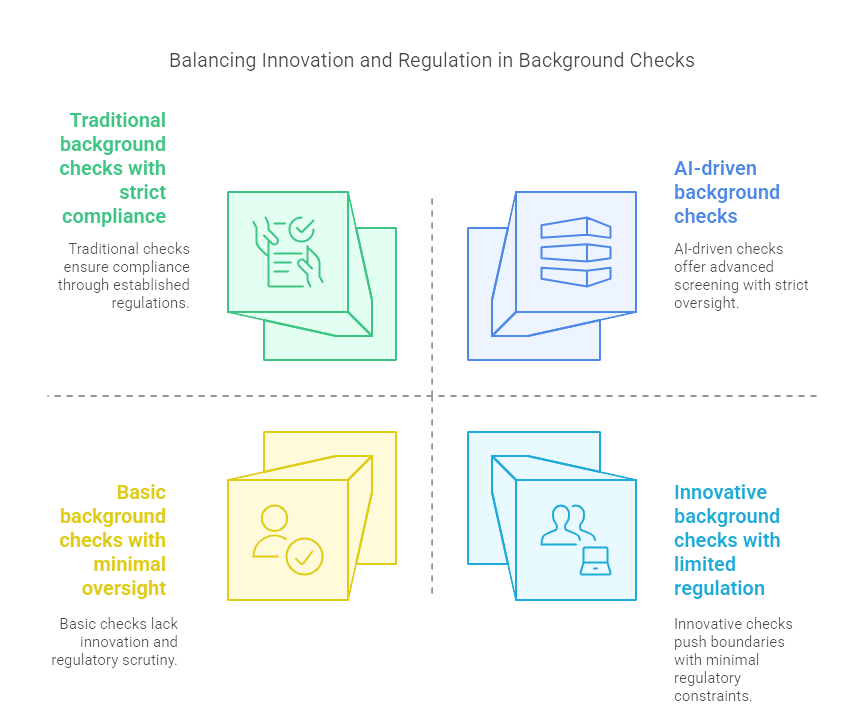Navigating the murky waters of employment screening can be daunting. One of the key aspects that both employers and employees must grapple with is the duration of background checks. In particular, the 10-year background check is a subject of great interest and relevance in many regions across the United States. This guide sheds light on "10-year background check states," hoping to equip you with essential knowledge whether you're an employer screening potential hires or a job seeker preparing for a new opportunity.
Key Takeaways
- A 10-year background check surveys an individual's past decade, offering comprehensive insights that can lead to safer hiring decisions and better job-hunting preparation.
- Federal guidelines, particularly the Fair Credit Reporting Act (FCRA), ensure that background checks are fair, accurate, and respectful of privacy, emphasizing transparency and consent.
- Background check regulations vary significantly among states and even cities, impacting the scope and duration of checks, with some states allowing or requiring 10-year look-backs for certain sectors.
- For employers, understanding and complying with diverse state-specific regulations can be costly but mitigate risks by uncovering potential issues in a candidate's history.
- Employees can prepare for 10-year background checks by verifying their own background data, managing their digital footprint, and being transparent about any discrepancies, supported by protective laws like the FCRA.
Introduction
A 10-year background check isn't a complex concept. It's what it sounds like: a background check that surveys the past decade. These checks dig into various records, from criminal history to employment timelines, all over a ten-year period. They matter because they paint a detailed picture of an individual's past, offering insights that less thorough screenings might miss. For employers, this can mean safer hiring decisions by reducing the risk of harboring unforeseen liabilities. For job seekers, understanding these checks and their implications can make the job hunt less intimidating.
The goal here is to pinpoint which states lean on this 10-year benchmark, giving you the lowdown on what they expect and what that means for both hiring managers and potential employees. Whether you're beefing up your HR protocols or gearing up for your next career move, knowing where you stand with these checks is crucial. This guide is here to untangle that web and provide clear insights.
EXPERT INSIGHT: Not all red flags are signs to stop—sometimes, they’re just markers of where someone has already fought to grow. As HR, we often find ourselves at the crossroads of warning and compassion, especially when it comes to background checks. That 10-year look-back may uncover treasures, for certain—but it will also unearth things in someone's history that no longer define them today. I've learned that our work isn't just to protect organizations from danger, but to battle on behalf of fairness and second chances. When we see individuals as more than a file, we get to the potential that resumes and reports can't always measure. - Charm Paz, CHRP
What is a 10-Year Background Check?
A 10-year background check isn't some herculean deep dive into your life but rather a focused look back over the last decade. It typically covers a few boxes to tick: your criminal history, credit reports, and employment history — the usual suspects. Criminal history often grabs the spotlight, as employers want to ensure there aren't any red flags in recent years. Credit reports may show how well you've managed your finances, especially if the job involves handling money. Employment history checks serve to verify that your resume isn't a work of imaginative fiction.
So, why the 10-year threshold? Some states opt for this duration to strike a balance between thoroughness and relevance. A decade is long enough to reveal a pattern of behavior without delving excessively into ancient history. It's about getting a clear snapshot of your past while still keeping it somewhat recent. Also, extended background checks can help identify trends that shorter ones might miss, allowing for a more comprehensive risk assessment.
In a nutshell, the 10-year background check isn't just about finding dirt; it's about creating a well-rounded picture of who you are today, based on where you've been. For employers, it's a risk management tool. For employees, it’s a chance to put your best foot forward by understanding what might pop up and preparing accordingly.
Federal Guidelines on Background Checks
While states can set their own requirements for background checks, there are overarching federal regulations that guide these practices. The Fair Credit Reporting Act (FCRA) is one such key piece of legislation. It outlines how background checks should be conducted, particularly in terms of obtaining consent, handling disputes, and maintaining accuracy. Though it doesn't specifically mandate a 10-year look-back, the FCRA ensures that companies using consumer reports for employment have to follow reasonable procedures to ensure fairness and privacy.
The Federal Trade Commission (FTC), which enforces the FCRA, provides valuable guidance on this process. They emphasize transparency—employers must inform candidates before a background check is conducted and get their written permission. Moreover, if any part of the report leads to an adverse employment decision, the employer is required to provide the applicant with a copy of the report along with a “Summary of Rights under the FCRA.” This ensures the candidate can address any inaccuracies and know their rights.
Navigating these federal guidelines is crucial for employers aiming to implement lawful background checks. While federal laws don't specify a time frame for background checks, they underscore the importance of fairness, accuracy, and respect for privacy within any duration an employer decides to explore, be it 10 years or otherwise.

Which States Require 10-Year Background Checks?
When it comes to employment screening, one size definitely does not fit all, especially in the United States, where states have significant leeway in setting their own background check regulations. The variations can be pretty stark, with some states opting for comprehensive 10-year background checks. This section unpacks those differences.
California
- Requirement: 10 years for criminal records; employers can check beyond 10 years for certain positions.
- Based On: California Civil Code Section 1786.18
- Details: Generally restricts the reporting of convictions older than 7 years on consumer background checks. However, certain exemptions apply for positions with salaries over $125,000, allowing reporting beyond 7 years. While California focuses on 7 years, some positions may require a longer review.
New York
- Requirement: 10 years for most criminal records, with some restrictions; 7-year limit for some positions like credit history.
- Based On: New York General Business Law Section 380-j
- Details: New York limits background checks to 7 years for consumer credit reports but allows criminal convictions to be reported beyond 7 years. The duration can extend up to 10 years or more for criminal records if the position involves specific security or financial responsibilities.
Texas
- Requirement: Up to 10 years, varies by employer; employers may perform deeper checks for high-level roles.
- Based On: Texas Business and Commerce Code Section 20.05
- Details: Texas has no statewide law strictly limiting background checks to 7 or 10 years. Background checks are often employer-driven, and certain industries may conduct checks that extend back up to 10 years, especially for high-level roles.
Florida
- Requirement: 10 years, certain felonies may be reviewed longer; the financial industry may require checks beyond 10 years.
- Based On: Florida Statutes Chapter 435 (Employment Screening)
- Details: Florida’s background check laws allow reporting of criminal history without a strict 7-year limitation, making it possible for employers to review records up to 10 years, particularly in sensitive positions like those in the financial industry.
Georgia
- Requirement: 10 years, employers have discretion; employers often focus on the last 10 years but can go further.
- Based On: Georgia Code Section 35-3-34
- Details: No strict limitation is set for reporting criminal records, so employers often conduct checks going back 10 years, especially when required by the nature of the job. The state law requires records to be accurate but does not limit the timeframe for criminal history.
Washington
- Requirement: 10 years for criminal records, 7 years for some positions; exceptions exist for high-security positions.
- Based On: Revised Code of Washington (RCW) 19.182.040
- Details: Washington state law limits consumer reporting agencies from disclosing criminal records older than 7 years unless the position pays over $20,000 annually. For some high-security roles, records may be reviewed beyond 7 years, allowing a 10-year review period.
Nevada
- Requirement: Up to 10 years for criminal records; gaming and financial sectors often check further.
- Based On: Nevada Revised Statutes (NRS) 598C.150
- Details: Limits reporting of criminal convictions older than 7 years for most roles. However, background checks for positions in gaming or financial services may go back up to 10 years, depending on the employer's discretion and industry regulations.
Oregon
- Requirement: 10 years for criminal background checks; generally focuses on 10 years but varies by employer policy.
- Based On: Oregon Revised Statutes (ORS) 659A.030
- Details: Oregon does not explicitly restrict background checks to a specific number of years, and employers can review up to 10 years, particularly for sensitive positions. Reporting must be accurate and non-discriminatory, with a focus on recent offenses.
Illinois
- Requirement: 10 years, longer for specific positions; healthcare and education may conduct deeper checks.
- Based On: Illinois Compiled Statutes (ICL) 820 ILCS 55/10 (Employee Background Fairness Act)
- Details: Illinois allows the reporting of criminal convictions without a strict 7-year limit, especially for roles in healthcare, education, and other regulated industries. Employers often review up to 10 years of history for these roles.
Michigan
- Requirement: 10 years, varies by employer and industry; some positions like security roles may review records beyond 10 years.
- Based On: Michigan Compiled Laws (MCL) 37.2205a (Elliott-Larsen Civil Rights Act)
- Details: Michigan does not have a specific law limiting background checks to a set number of years, allowing employers to perform comprehensive reviews that may go back 10 years or more, especially for roles in sensitive industries like security.

Variation Among States
It's crucial to understand that while federal laws provide a baseline, states can and do implement their own rules regarding background checks. This means that the duration that an employer can look back into a candidate's history is not universally set across the country. Local legislations might significantly alter the scope and depth of background checks, sometimes extending them from the usual seven years to ten in certain jurisdictions.
Specific States
Several states are known for their 10-year background check requirements, although "require" might be a bit misleading. Some states enable 10-year checks, usually for particular sectors like healthcare, law enforcement, and finance where more extensive checks are deemed necessary. For instance, California allows a 10-year look-back period specifically in certain contexts, aligning with state-specific regulations that apply additional scrutiny due to the nature of the job. Similarly, New York and Texas have provisions that can extend the background check period, particularly for roles involving sensitive information or vulnerable populations.
Influence of Local Laws
Adding another layer of complexity are municipalities within these states, which sometimes impose even stricter regulations. For instance, certain cities may have unique ordinances mandating more rigorous checks than the state average. Employers operating across multiple cities face the challenge of navigating these varied local laws, which can complicate uniform hiring practices and policies.
Understanding these state-specific and sometimes even city-specific regulations is essential for both employers and job seekers. Staying informed helps in ensuring compliance and setting accurate expectations, reducing the chances of misunderstanding and potential legal pitfalls.
Implications for Employers
Adhering to state-specific regulations requiring 10-year background checks isn't just a bureaucratic hurdle—it impacts your bottom line. First off, the compliance costs can't be ignored. Navigating through varied state laws requires either a dedicated legal team or outsourcing to specialized background check companies, and neither option comes cheap. These costs extend beyond just money; consider the time and effort required to implement and maintain these processes.
But there’s a silver lining: risk mitigation. Delving into a potential hire’s past can safeguard your company from potential threats. Longer look-back periods can unearth issues that might have otherwise gone unnoticed, allowing you to make employment decisions backed by more comprehensive data.
Finally, there’s the not-so-small matter of developing internal policies. With the legislative landscape varying greatly from one state to another, your HR department should prioritize creating flexible, adaptable policies that meet these varying requirements. It's about building a framework that embraces legal compliance while remaining agile enough to incorporate new developments. Investing in such policies can pay dividends by paving the way for smoother hiring processes and reducing the risk of penalties.
Implications for Employees
When you’re on the hunt for a new job, the thought of a background check stretching back a decade can be unsettling. For many, privacy concerns loom large. Imagine every employer having a window into your life for the past ten years—employment history, credit score, possibly even criminal records. It's a lot to process. But remember, there are legal fences in place to protect you from unnecessary snooping.
Employees aren't left defenseless in this process. The Fair Credit Reporting Act (FCRA), for example, puts a leash on how and when your information can be retrieved and used. It also requires employers to get your permission before running a check and to provide you with a copy of the report if they uncover things that might cost you the job. If you find errors, you're entitled to dispute them, ensuring your report reflects the real you, not some outdated or wrong data point.
So, what should you do to be ready? First, do some sleuthing yourself. Run a background check on... well, you. This way, you see what employers might see and spot potential red flags beforehand. Also, tidy up your digital footprint—scrub any social media content that's dodgy or outdated. Finally, have an explanation ready for any blips a background check might reveal, such as a brief unemployment period or a resolved debt. Honesty is your best ally here; transparency often speaks volumes to employers. Prepare well, and you’ll find that the 10-year look-back doesn’t have to be as intimidating as it seems.
The Future of Background Checks
The world of background checks is on the cusp of significant evolution, driven by rapid technological advancements and shifting societal expectations. While privacy concerns gain traction, technology continues to offer more sophisticated methods for conducting background screenings, such as artificial intelligence and blockchain. These tools promise quicker, more comprehensive, and possibly more secure assessments. However, they also present new privacy challenges and ethical considerations, necessitating careful regulation and transparency.
In terms of legislative developments, several states are considering changes to their background check regulations, which could impact the duration of look-back periods. Factors such as the increasing importance of remote work, calls for criminal justice reform, and evolving notions of privacy will likely influence these changes. Legislative proposals in some states aim to balance privacy rights with the need for thorough vetting, potentially reducing the standard look-back period while enhancing consumer protections.
As this domain progresses, stakeholders—employers, job seekers, and policymakers—will need to stay informed about technological innovations and changing legal landscapes. This knowledge will prove crucial in navigating the future complexities of background checks while ensuring fairness, privacy, and compliance. With ongoing dialogue and adaptation, the background check process can evolve to meet the needs of all parties involved, fostering trust and security in employment practices.

Frequently Asked Questions
What states do 10-year background checks?
Some states allow employers to conduct 10-year background checks, but regulations vary. States like Hawaii, California, Kansas, Maryland, Massachusetts, Montana, New Mexico, and Washington typically limit reporting of convictions to the past seven years. Always check specific state policies for accurate information.
Are 10-year background checks common for all jobs?
No, 10-year background checks are not standard for all jobs. The duration often depends on the industry, the position level, and state laws. Sensitive positions in finance or security might require more extensive checks, while others adhere to shorter periods.
Can employers see 10 years of history on a background check?
Employers can sometimes access 10 years of history, especially for roles with higher security or fiduciary responsibility. However, many states and companies limit this to seven years due to legal restrictions and industry standards.
How far back do most background checks go?
Most standard background checks go back seven years, aligning with state laws restricting reporting older convictions. Exceptions exist for positions requiring deeper scrutiny or in states allowing longer periods. Always verify based on the job type and specific regulations.
Do all states follow the 10-year background check rule?
No, not all states follow a 10-year background check rule. Typically, the allowable check duration varies, with many states capping it at seven years. Verify state-specific regulations to understand applicable rules for background checks.
How does a 10-year background check differ from a 7-year check?
A 10-year background check covers a person's history over the past decade, potentially revealing older information, whereas a 7-year check is limited to more recent history. Employers might choose the duration based on state laws and job requirements.
Conclusion
Understanding the intricacies of state laws on 10-year background checks is crucial in today’s job market. For employers, this knowledge helps ensure compliance and minimize risk. For employees, it provides clarity on what to expect and how to safeguard personal information. The landscape of employment screening is constantly changing, and staying informed is the best way to navigate it effectively. As you consider the implications of these requirements, remember that preparation is key. Being proactive—whether you're developing a company's screening policy or preparing for a job search—empowers you to tackle these challenges head-on.
For those interested in diving deeper, exploring topics such as the duration of background checks can further enhance your understanding and readiness. Embrace this journey, stay curious, and keep ahead of the curve as the dynamics of employment screening continue to evolve.
Resources
Still have questions?
Get in touch with our team today for a personalized demo and discover how our tailored volume pricing and packages can drive results for your business!
How useful was this page?*
Note: your comments are anonymous. We use them to improve the website. Do not include any personal details.
Visit our FCRA Compliance Tool or leave a message here if you need a response.
From the blog Explore the GCheck Content Hub

Background Screening for Remote Employees: A 2026 Operational Guide
27 Jan, 2026 • 16 min read
What Drugs Does a 10 Panel Test Detect? 2026 Guide for Workplace Screening
27 Jan, 2026 • 21 min read
Level 1 vs Level 2 Background Checks: A Strategic Framework for 2026 Hiring Decisions
27 Jan, 2026 • 19 min readThe information provided in this article is for general informational and educational purposes only and should not be construed as legal advice or a substitute for consultation with qualified legal counsel. While we strive to ensure accuracy, employment screening laws and regulations—including but not limited to the Fair Credit Reporting Act (FCRA), Equal Employment Opportunity Commission (EEOC) guidelines, state and local ban-the-box laws, industry-specific requirements, and other applicable federal, state, and local statutes—are subject to frequent changes, varying interpretations, and jurisdiction-specific applications that may affect their implementation in your organization. Employers and screening decision-makers are solely responsible for ensuring their background check policies, procedures, and practices comply with all applicable laws and regulations relevant to their specific industry, location, and circumstances. We strongly recommend consulting with qualified employment law attorneys and compliance professionals before making hiring, tenant screening, or other decisions based on background check information.


